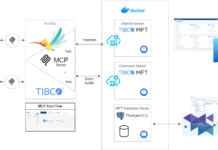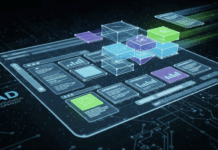 What happens when a whole generation that has lived their entire lives with the ability to feed information to themselves (and at a time and format of their choosing) becomes the dominant group in the workforce? What happens when this group of entirely social, entirely digital, entirely in-command-of-their-world workforce is running the critical elements of how we conduct business? This will be the first time in history that a group has gone birth-to-business with their hands firmly on the wheel of information technology.
What happens when a whole generation that has lived their entire lives with the ability to feed information to themselves (and at a time and format of their choosing) becomes the dominant group in the workforce? What happens when this group of entirely social, entirely digital, entirely in-command-of-their-world workforce is running the critical elements of how we conduct business? This will be the first time in history that a group has gone birth-to-business with their hands firmly on the wheel of information technology.
The simple life
 We grew up being fed information. We learned from our parents, teachers and the evening news. We knew exactly and only what we digested from people, books and a limited amount of video. College was no different and certainly the workplace was the same. There was a time and place for each step of the way, and it was defined and scheduled by other people. “Happy Days” could only be seen one night per week and if you missed it, it was gone forever. You took certain classes in your first semester of college because that’s the only way you’d be finished before graduation.
We grew up being fed information. We learned from our parents, teachers and the evening news. We knew exactly and only what we digested from people, books and a limited amount of video. College was no different and certainly the workplace was the same. There was a time and place for each step of the way, and it was defined and scheduled by other people. “Happy Days” could only be seen one night per week and if you missed it, it was gone forever. You took certain classes in your first semester of college because that’s the only way you’d be finished before graduation.
 We followed the proven path. Since the dawn of the workplace, that proven path has meant we hire and train to create a junior version of ourselves. We want the next generation to learn what we know and to gradually become more proficient at what we already do. We expect improvements along the way that technology enables, but no seismic shifts. Even with the arrival of the PC, which was first adapted to automate accounting and word processing (an automation of the ledger and the typewriter–the latter of which was just an automation of the task of handwriting), the change has been gradual and steady, even while accelerating. What if the expectations of our future hires won’t let it happen that way? What if the coming generation has only lived in a world that allows for instantaneous communication and receipt of ideas? What happens when an elementary student has at his fingertips the ability to know exactly what is happening in any far-flung corner of the world? What type of expectations are being developed and how will those expectations affect the world of business and how work is done?
We followed the proven path. Since the dawn of the workplace, that proven path has meant we hire and train to create a junior version of ourselves. We want the next generation to learn what we know and to gradually become more proficient at what we already do. We expect improvements along the way that technology enables, but no seismic shifts. Even with the arrival of the PC, which was first adapted to automate accounting and word processing (an automation of the ledger and the typewriter–the latter of which was just an automation of the task of handwriting), the change has been gradual and steady, even while accelerating. What if the expectations of our future hires won’t let it happen that way? What if the coming generation has only lived in a world that allows for instantaneous communication and receipt of ideas? What happens when an elementary student has at his fingertips the ability to know exactly what is happening in any far-flung corner of the world? What type of expectations are being developed and how will those expectations affect the world of business and how work is done?
 High expectations
High expectations
The group that we call Generation Z has been given an enormous advantage of having to learn how to sort through enormous amounts of information to be able to understand what they’re really seeing. I recently read The Two-Second Advantage, a Malcolm Gladwell-like book about how we learn and build mental models that predict what will happen next based on experience and data that arrives so quickly it would overwhelm–if not for our learned ability to work through it. Most of Generation Z has been living in a state of information overload longer than any human beings before them, and the result should be a capability to handle a complex world even better than we do. They should have more complete mental models for the workings of the world due to their ability to know whatever they choose, whenever they want. If you buy into the ideas of this book, they are likely developing a “two-second advantage” that should give them a leg up on the older generations.
Life as a playlist
 Depending on the source, Generation Z was born between 1991 and 2001. They’ve grown up in a “playlist world” where they can customize their life and take only the elements that matter, not the whole album. Their expectations will be no different when they begin their careers…they won’t expect to be given the entire “album” of work instructions. Instead they’ll expect to be able to find and digest only the information that matters to their daily tasks.
Depending on the source, Generation Z was born between 1991 and 2001. They’ve grown up in a “playlist world” where they can customize their life and take only the elements that matter, not the whole album. Their expectations will be no different when they begin their careers…they won’t expect to be given the entire “album” of work instructions. Instead they’ll expect to be able to find and digest only the information that matters to their daily tasks.
At another level, they have been able to see their world in an amazingly clear context. They know the most intimate details of whatever they choose to know. In the same way, they will expect to see their efforts in the context of the broader enterprise’s efforts. That connectivity and visibility are their gratification. They come from an amazingly democratic and interconnected technological world and will expect to contribute immediately and for their efforts to be just as visible and open to feedback as their web-enabled social interaction.
Lest we be judged
 We could be fooled into thinking they are impatient and only gratified in the instant. We could think they have acquired ADD as a birth condition. That would be selling them short and wouldn’t capture the amazing energy and creativity they uniquely bring. Their lives assume a high level of technology-enabled interaction. And they don’t just decide on technology, they depend on it to do the most common thing we all do, find out and communicate.
We could be fooled into thinking they are impatient and only gratified in the instant. We could think they have acquired ADD as a birth condition. That would be selling them short and wouldn’t capture the amazing energy and creativity they uniquely bring. Their lives assume a high level of technology-enabled interaction. And they don’t just decide on technology, they depend on it to do the most common thing we all do, find out and communicate.
Useful work systems need to be designed and revamped to harness these new ways of thinking and doing because Generation Z will format their world to their tastes…because they’ve been taught that life can be tailor-made. They can and will collaborate online with people they’ve never even met. They aren’t limited to home or desk computers as they carry everything they need in their pockets. They believe work can be the same way. Work will be the same way. In similar words, the Nimbus’, Ian Gotts, talks about the generation that is already here. We can certainly extrapolate his Gen Y arguments to the generation that can’t be expected to comprehend life in the era before the Web.
We have an amazing opportunity to plan for this inevitable sea change and for it to be less of a cultural clash. After all, the iGeneration will need to use their best skills to solve some of the worst socioeconomic, environmental, and security challenges ever to face our planet. They will also be funding our retirement. Both of those points are enough to get my attention.





